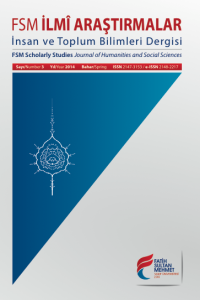Öz
Reality is a problematic that debated for centuries of literary work. This matter of reality
was evaluated more likely according to the themes of the work. Creating the center of
reality of the social facts and events had drifted the literature world to impasse. Sigmund
Freud’s studies on human psychology of the individual with the emergence of a new
reality create the foundation to be published surrealist manifesto under the leadership of
Andre Breton. Taking on the reality of society and its problems leaves its locating to the
individual’s sociological, psychological and intellectual of reality of the world. In an era
of reality that is jammed with social issues on Turkish literature, Ahmet Hamdi Tanpınar
and then Sait Faik’s stories with a new understanding of reality would have emerged to
belong to individual. This situation brings also the sürrealist tendencies on the story of the
1950 generation. Orhan Duru is the most remarkable storyteller with sürrealist tendencies
in his stories in this generation.
Anahtar Kelimeler
Kaynakça
- Abasıyanık, Sait Faik, Havada Bulut, YKY, İstanbul, 2010.
- Akarsu, Bedia, Felsefe Terimleri Sözlüğü, TDK Yayınları, Ankara, 1975.
- Akatlı, Füsun, Bir Pencereden, Adam Yayınları, İstanbul, 1982.
- Bezirci, Asım, Günlerin Götürdüğü Getirdiği, Ataç Kitapevi, İstanbul, 1962.
- Breton, Andre, Sürrealist Manifestolar (çev. Ayşe Güngör), Altıkırkbeş Yayınları, İstanbul, 2009.
- Buyrukçu, Muzaffer, “Fırtına”, Cumhuriyet Kitap, 2.7.1998, s.4-5.
- Çetişli, İsmail, Edebi Akımlar, Akçağ Yayınları, Ankara, 2004.,
- Dirlikyapan, Jale Özata, Kabuğunu Kıran Hikaye, Metis Yayınları, İstanbul, 2010.
- _____ ,_____, “Yetenek”, Pazar Postası, 3.6.1956, s.7.
- _____, _____, Ağır İşçiler, Soyut Yayınevi, İstanbul, 1974.
- _____, _____, Bırakılmış Bir, Ada Yayınları, İstanbul, 1987.
- _____ ,_____, Bir Büyülü Ortamda, Remzi Kitapevi, İstanbul, 1991.
- _____, _____, Denge Uzmanı (Sarmal-toplu öyküler), YKY, İstanbul, 1996.
- _____, _____, Yoksullar Geliyor (Sarmal-toplu öyküler), YKY, İstanbul, 1996:
Öz
Gerçeklik, edebi eserin yüzyıllar boyu tartışılan bir sorunsalıdır. Bu gerçeklik meselesi,
daha çok eserin ele aldığı konuya göre değerlendirilmiştir. Toplumsal olay ve olguların
gerçekliğin merkezini oluşturması, edebiyat dünyasını bir çıkmaza sürüklemiştir. Sigmund
Freud’un insan psikolojisine yönelen çalışmalarıyla bireye ait yeni bir gerçekliğin
ortaya çıkması, Andre Breton öncülüğünde gerçeküstücü manifestonun yayınlanmasına
zemin yaratır. Toplumu ve onun sorunlarını ele alan gerçeklik yerini, bireyin sosyolojik,
psikolojik ve düşünsel dünyasının gerçekliğine bırakır. Türk edebiyatında da gerçekliğin
toplumsal meselelerle sıkıştığı bir dönemde Ahmet Hamdi Tanpınar ve daha sonra Sait
Faik’in öyküleriyle bireye ait yeni bir gerçeklik anlayışı ortaya çıkmış olur. Bu durum,
1950 kuşağının öykülerinde gerçeküstücü yönelimleri de beraberinde getirir. Orhan Duru,
bu kuşak içinde öykülerindeki gerçeküstücü yönelimleriyle en dikkat çeken öykücü olur.
Anahtar Kelimeler
Kaynakça
- Abasıyanık, Sait Faik, Havada Bulut, YKY, İstanbul, 2010.
- Akarsu, Bedia, Felsefe Terimleri Sözlüğü, TDK Yayınları, Ankara, 1975.
- Akatlı, Füsun, Bir Pencereden, Adam Yayınları, İstanbul, 1982.
- Bezirci, Asım, Günlerin Götürdüğü Getirdiği, Ataç Kitapevi, İstanbul, 1962.
- Breton, Andre, Sürrealist Manifestolar (çev. Ayşe Güngör), Altıkırkbeş Yayınları, İstanbul, 2009.
- Buyrukçu, Muzaffer, “Fırtına”, Cumhuriyet Kitap, 2.7.1998, s.4-5.
- Çetişli, İsmail, Edebi Akımlar, Akçağ Yayınları, Ankara, 2004.,
- Dirlikyapan, Jale Özata, Kabuğunu Kıran Hikaye, Metis Yayınları, İstanbul, 2010.
- _____ ,_____, “Yetenek”, Pazar Postası, 3.6.1956, s.7.
- _____, _____, Ağır İşçiler, Soyut Yayınevi, İstanbul, 1974.
- _____, _____, Bırakılmış Bir, Ada Yayınları, İstanbul, 1987.
- _____ ,_____, Bir Büyülü Ortamda, Remzi Kitapevi, İstanbul, 1991.
- _____, _____, Denge Uzmanı (Sarmal-toplu öyküler), YKY, İstanbul, 1996.
- _____, _____, Yoksullar Geliyor (Sarmal-toplu öyküler), YKY, İstanbul, 1996:
Ayrıntılar
| Birincil Dil | Türkçe |
|---|---|
| Bölüm | Araştırmalar ve İncelemeler |
| Yazarlar | |
| Yayımlanma Tarihi | 3 Temmuz 2014 |
| Yayımlandığı Sayı | Yıl 2014 Sayı: 3 - Bahar |

